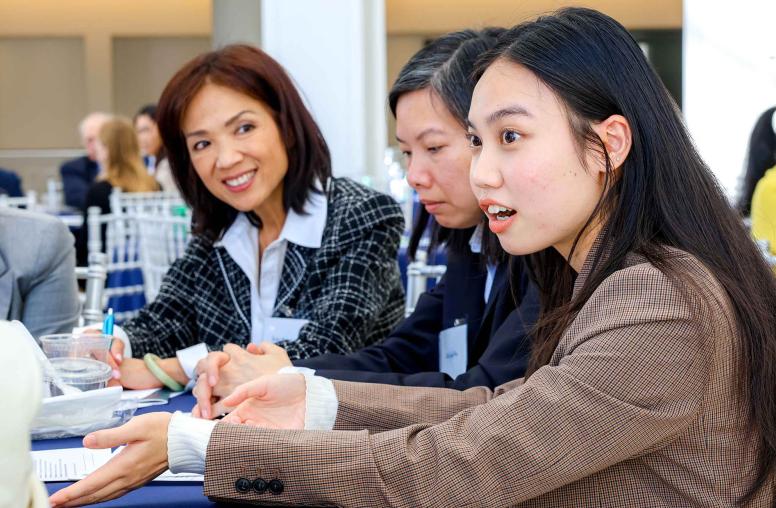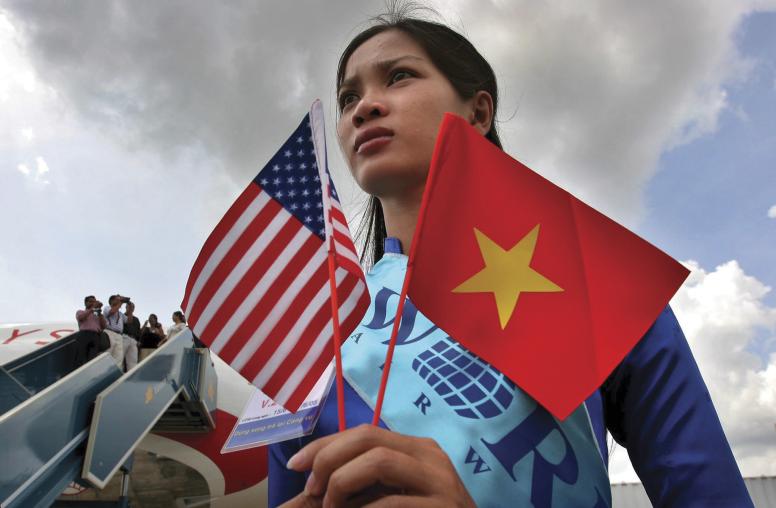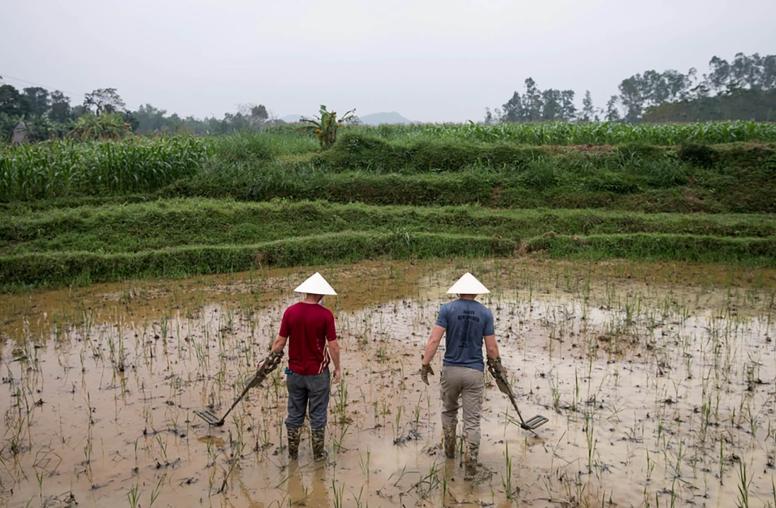It Is Time to Account for All Missing Vietnamese
As the 50th anniversary of the Vietnam War’s end draws close, recognition of sacrifices made on all sides can help healing.
Editor’s Note: This piece has been published alongside “Piecing Together the Fragments of Memory to Find Vietnamese War Dead” as part of USIP’s work to offer a comprehensive understanding of war-related recovery and reconciliation efforts in Vietnam.
As the 50th anniversary of the end of the Vietnam War approaches in 2025, the subject of remains recovery, those missing in action, and the memorialization of war-related dead from the Republic of Vietnam (RVN or South Vietnam) deserves attention. While the governments of the United States and Vietnam have attempted to locate and honor fallen soldiers, the war dead affiliated with the former RVN have not been officially recognized or effectively addressed.

The Vietnam War cost the lives of more than a million North Vietnamese and Viet Cong troops on the winning side. The war also took the lives of 58,220 U.S. service members and an estimated 200,000 to 250,000 RVN soldiers. These figures exclude the approximately 2 million Vietnamese, Cambodian and Laotian civilians who died. Regrettably, the majority of these bodies are still missing.
Finding, identifying and interring the war dead, including those who perished in combat or in postwar reeducation camps, are critical tasks for ethical, ceremonial and healing reasons. Both the United States and present-day Vietnam (officially known as the Socialist Republic of Vietnam, or SRV) have made attempts and aided each other in locating and retrieving missing service personnel. The United States has expended substantial resources in the search for the approximately 1,500 U.S. personnel still missing, while the SRV has undertaken similar efforts to identify and remember soldiers who died fighting on the communist side.
The handling of war dead affiliated with the RVN, on the other hand, offers a starkly contrasting picture. Despite the fact that the number of unrecovered civilians and RVN soldiers is unknown, the RVN's war dead have never received adequate acknowledgement from either the Vietnamese government or the United States. U.S. soldiers fought and sacrificed alongside RVN soldiers for a country that aspired to, and was fighting a war to defend, many of the same values that the United States represents.
Furthermore, since the war's end, the United States has served as an adopted home for many Vietnamese Americans, including those who have yet to find answers about the whereabouts of their missing husbands and dads. This raises concerns about how war dead are treated after hostilities end.
After April 30, 1975, the RVN ceased to exist, having no political representation to speak for its fallen soldiers. As a result, the RVN-affiliated war dead and their burial locations, such as the Biên Hoà military cemetery (now Bình An cemetery) and many other lesser-known RVN military cemeteries, are sometimes viewed as vestiges of an enemy state, excluded from societal recognition. Because of this delegitimization, RVN soldiers’ final resting places have been neglected and ignored.
Accounting Efforts
Because of limited official representation and recognition, most attempts to account for RVN troops who are missing in action have been carried out on a small scale by individual families and many official and unofficial nonprofit groups. The Vietnamese American Foundation (VAF), led by Nguyễn Đạc Thành, an RVN veteran and former reeducation camp prisoner, is conducting one of the most well-known of these efforts. For nearly two decades, the VAF has worked to account for reeducation camp detainees who died while imprisoned, as well as to restore the Bình An cemetery.
Recognizing the overall disparity in recognition and support for addressing the issue of RVN-associated war dead and providing solace and support to families affected by the loss of their loved ones, Texas Tech University's Vietnam Center and Sam Johnson Vietnam Archive has launched a humanitarian project to raise awareness and gather information about RVN war dead. The goal is to establish a database to aid in the identification of potential grave locations so that remains can be returned to their relatives. Launched at the end of 2022, the project has compiled a list of 91 reeducation camps where RVN personnel were imprisoned, as well as the names of over 700 RVN personnel who died in prisons around Vietnam.
A Necessary Step Toward Healing and Reconciliation
Acknowledging the fallen RVN soldiers is not simply a justice and remembrance issue, it also has humanitarian ramifications for postwar reconciliation and healing, particularly among Vietnamese, including many Vietnamese Americans. A collaborative and comprehensive approach is required to address this challenge in the years leading up to the 2025 milestone and beyond.
First, the United States and Vietnam should publicly recognize the RVN soldiers' contributions and recognize their right to a proper burial and memorial. This would necessitate the establishment of communication and cooperation channels to address the logistical challenges connected with locating and identifying the war dead.
Second, financial, technical and administrative assistance should be provided to aid in the recovery of the fallen RVN soldiers. The United States, as a former ally of the RVN and the current home of many overseas Vietnamese, must play a critical role in advocating for such an effort as well as offering knowledge and resources, drawing on its experience in identifying missing U.S. personnel. Collaboration between the United States and Vietnam could result in more effective and efficient efforts to locate and repatriate RVN war dead. This includes granting access to records from the Library of Congress, the National Archives and the Defense POW/MIA Accounting Agency, as well as Vietnam’s provincial and national libraries and National Archives 2, 3 and 4 in Ho Chi Minh City, Hanoi and Dalat, respectively. Access to these invaluable sources of historical records, documents and information is critical for researchers seeking useful insights about RVN war dead.
Efforts should also be made to raise public awareness regarding the importance of accounting for RVN war dead. These initiatives should reach a broad audience, with a special emphasis on engaging Vietnamese veterans and prison guards who may have significant information about RVN soldiers missing in action, such as mass graves, burial sites and prison camp locations throughout Vietnam. These efforts should also involve U.S. veterans and the Vietnamese diaspora, particularly Vietnamese Americans who have a vested interest in having their compatriots accounted for and remembered, as well as anyone who may have knowledge about U.S. and Vietnamese war dead. Thus, encouraging everyone to share pertinent information will not only uncover vital information that could aid in the identification and recovery of RVN war dead, but all those killed in the war. Such research and public engagement efforts can help build a comprehensive database that will serve as the foundation for identifying, recovering and memorializing RVN war dead.
Healing and reconciliation can be fostered for all those touched by the war by recognizing the sacrifices made by all sides, aiding the recovery and identification of the RVN fallen, and assuring their rightful acknowledgement. Healing the wounds of war and bringing closure to families and communities that have lost loved ones is a moral duty and a small, yet necessary, step toward the reconciliation of people and nations. The impending 2025 anniversary serves as a significant milestone to move these initiatives forward and ensure that the war dead are ultimately accounted for, remembered and respected.
Alex-Thai D. Vo is an assistant research professor at the Vietnam Center and Sam Johnson Vietnam Archive, Texas Tech University.



